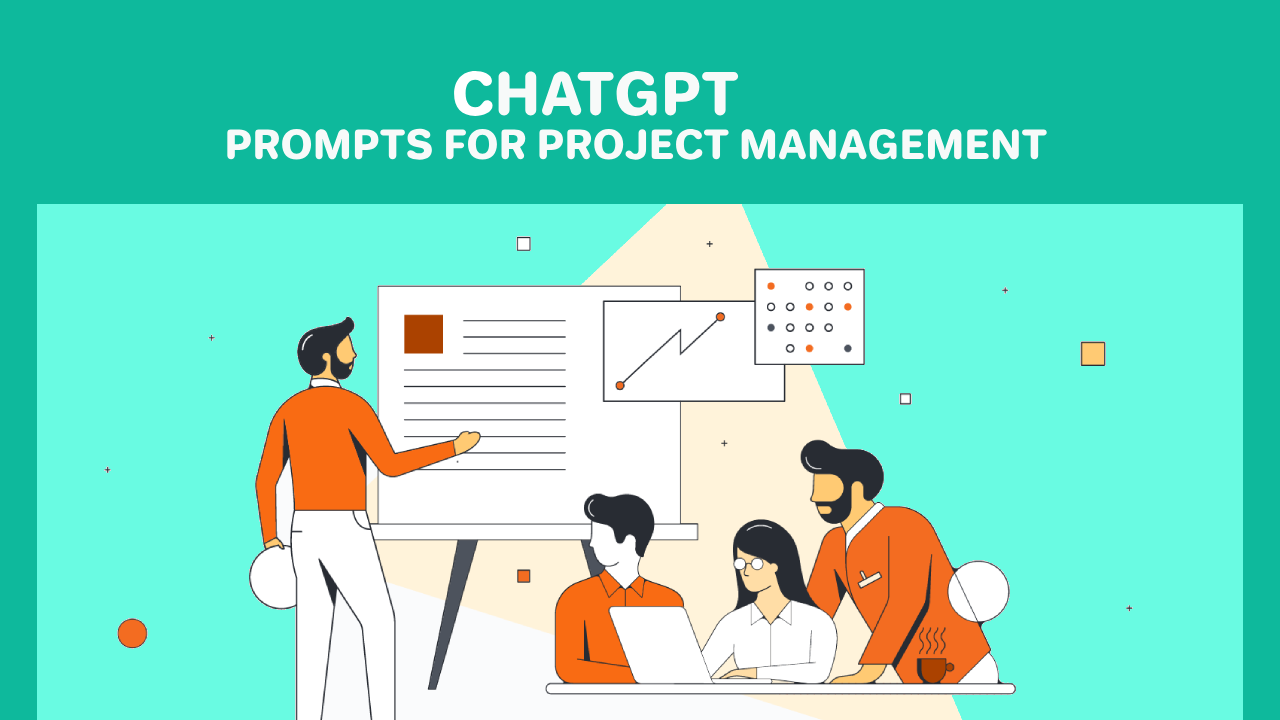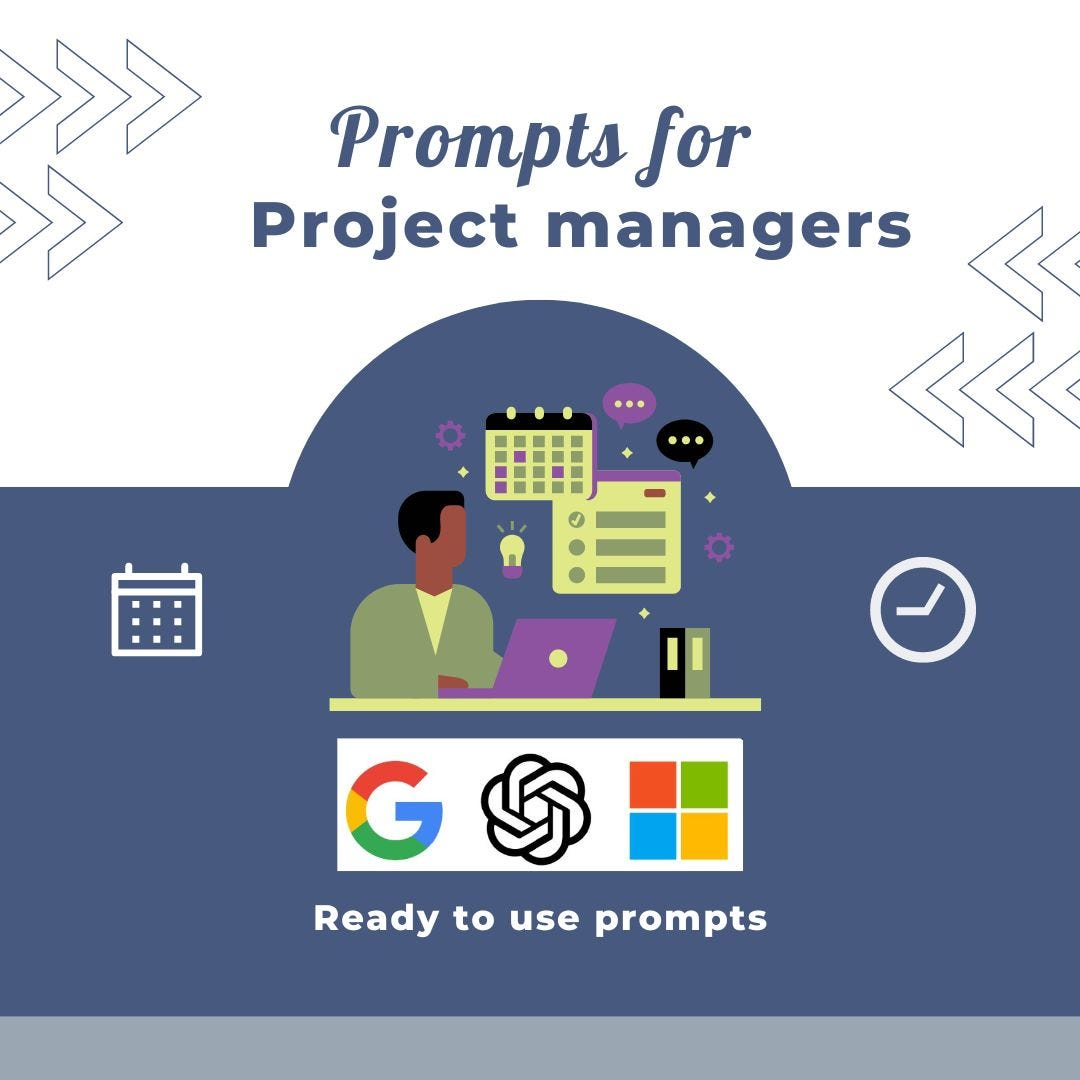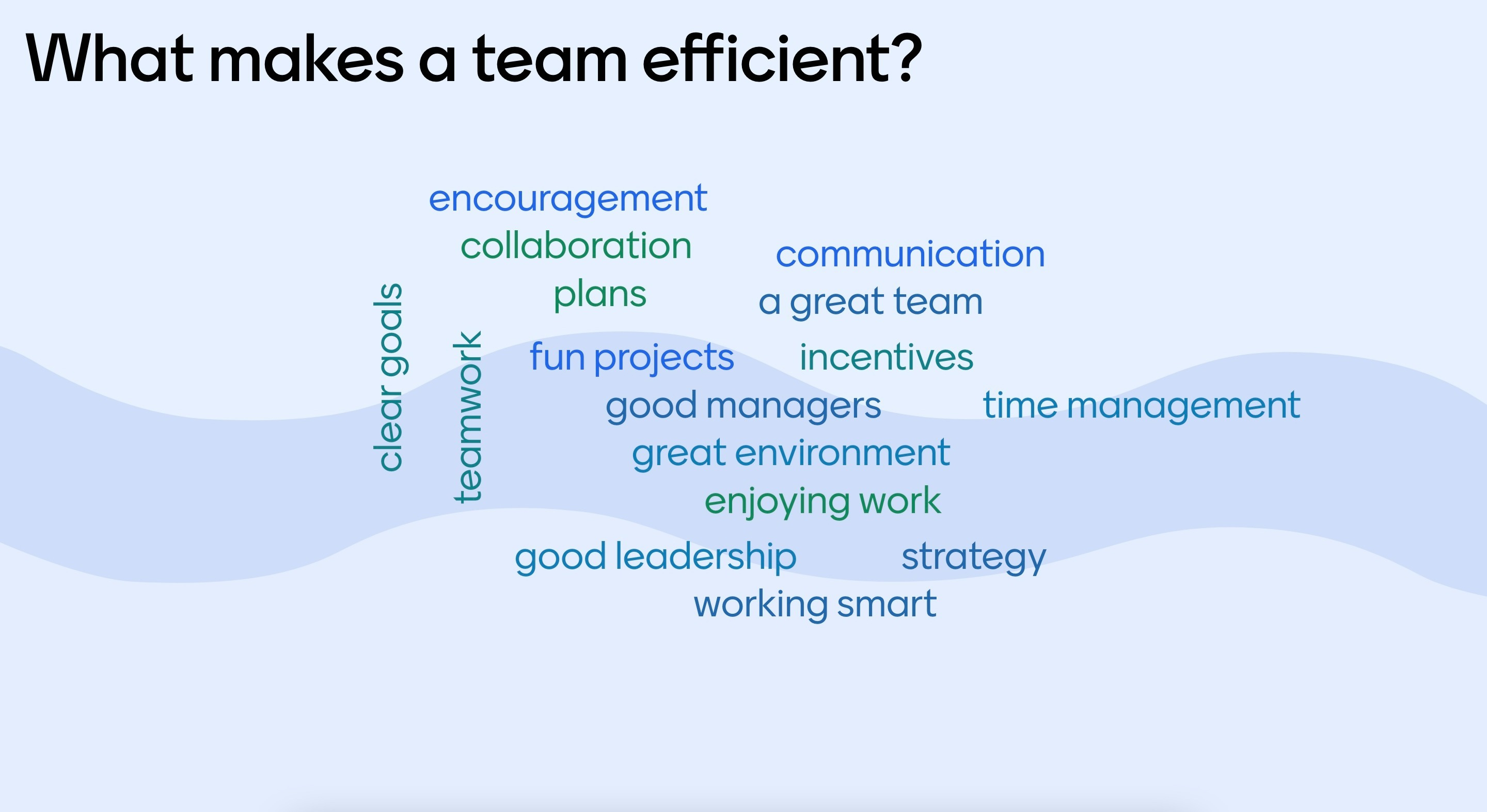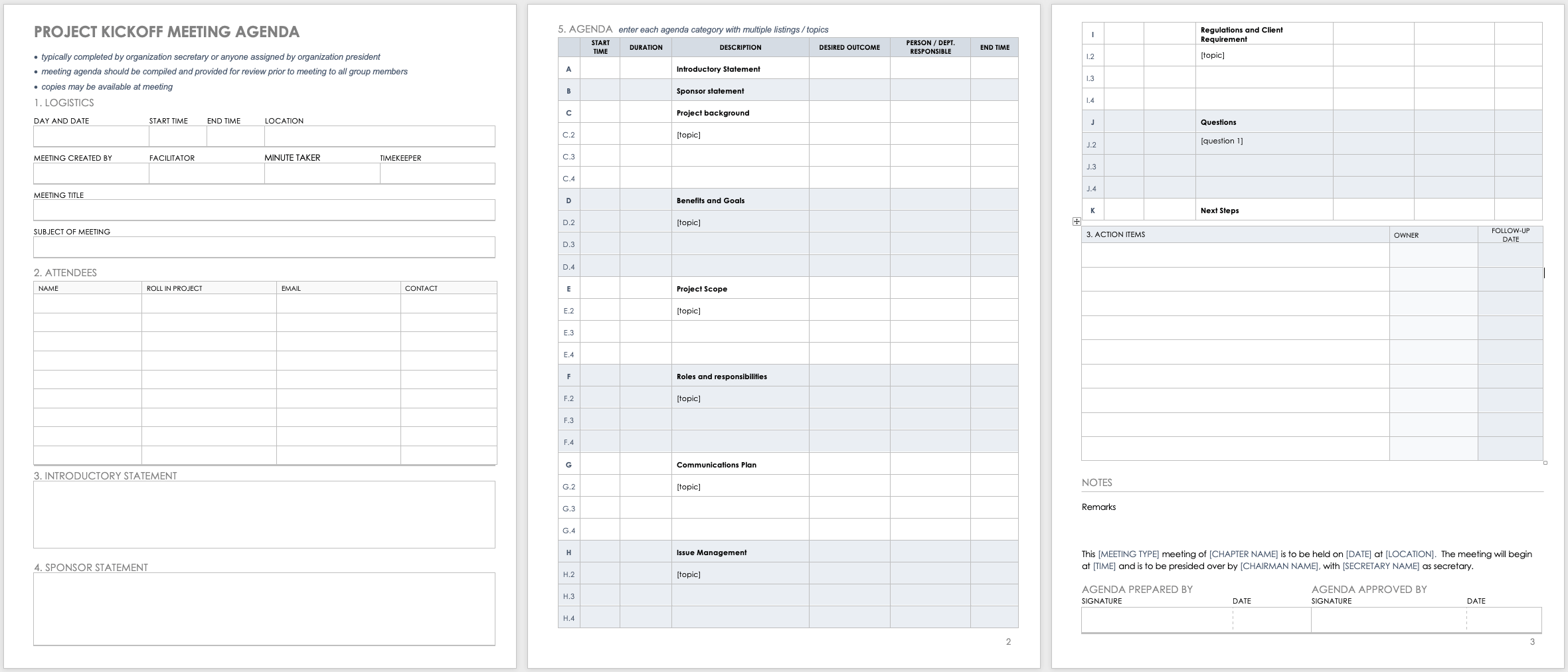
Revolutionize your project management approach with Chatgpt prompts for project managers.Seamlessly designed for project managers seeking a competitive edge, these prompts are your secret weapon for unparalleled efficiency and success. By leveraging ChatGPT's comprehensive prompts, you'll effortlessly navigate complex project milestones, tackle challenges head-on, and streamline your team's workflow with precision.
Gain access to a treasure trove of project management wisdom at your fingertips. Whether you're a seasoned professional or just stepping into the world of project management, ChatGPT's prompts serve as your trusted advisor, offering invaluable insights and actionable advice to elevate your projects to new heights. Maximize productivity, foster collaboration, and stay ahead of deadlines effortlessly, all while mastering the art of efficient resource allocation and risk mitigation.
ChatGPT Prompts For Project Managers
Here are 10 essential Chatgpt promptsfor project mangers:
1. Risk Assessment And Mitigation
Generate a comprehensive risk assessment plan for the project, outlining potential risks and corresponding mitigation strategies to preemptively address challenges.
2. Task Prioritization And Scheduling
Create a prioritized task list and optimal project schedule considering dependencies and deadlines to ensure efficient utilization of resources.
3. Stakeholder Communication Strategy
Devise a communication strategy that fosters clear and effective communication among project stakeholders, ensuring alignment and transparency throughout.
4. Problem-Solving Frameworks
Develop problem-solving frameworks or decision-making models to systematically address issues or roadblocks encountered during project execution.
5. Resource Allocation Optimization
Optimize resource allocation by generating a plan that efficiently allocates manpower, budget, and other resources across different project phases."
6. Quality Control And Assurance Guidelines
Craft quality control guidelines to maintain high standards throughout project delivery, ensuring the final output meets predefined quality benchmarks.
7. Change Management Strategies
Outline change management strategies to facilitate smooth transitions in case of alterations to project scope, requirements, or objectives.
8. Team Collaboration And Motivation Techniques
Suggest effective team collaboration and motivation techniques to enhance productivity, foster innovation, and maintain high team morale.
9. Performance Tracking Metrics
Define key performance indicators (KPIs) and metrics to track project progress, enabling continuous monitoring and timely adjustments."
10. Lessons Learned And Post-Project Evaluation
Create a framework for post-project evaluation, incorporating lessons learned and insights gained to improve future project managementendeavors.
These prompts serve as invaluable tools for project managers, guiding them through critical aspects of project execution while fostering efficient management practices and ensuring successful project outcomes.
Project Planning And Milestones
Project planning and milestones are the cornerstones of successful project execution. They provide a clear roadmap, keep your team on track, and help you celebrate achievements along the way.
Project Planning
Project planning involves defining your project's goals, scope, timeline, budget, resources, and tasks. It's like creating a blueprint for your project, ensuring everyone involved understands the big picture and their individual roles. Here are some key elements of effective project planning:
- Defining your project goals -What do you want to achieve with this project? Clearly defined goals will guide your decision-making throughout the project.
- Scoping your project -What will be included and excluded from the project? Clearly defining the scope helps avoid scope creep, which can derail your project.
- Creating a timeline -Break down the project into manageable phases and tasks, and estimate the time needed for each. Use tools like Gantt charts to visualize your timeline.
- Budgeting your project -Estimate the costs associated with your project, including personnel, materials, and equipment. Track your expenses and adjust your budget as needed.
- Identifying resources -What resources do you need to complete the project? This could include personnel, equipment, software, and materials.
- Breaking down tasks -Divide your project into smaller, actionable tasks. Assign tasks to team members based on their skills and availability.
Milestones
Milestones are markers of progress along your project timeline. They signal the completion of important phases or deliverables. Think of them as checkpoints that help you assess your progress and make adjustments as needed. Here are some benefits of using milestones:
- Increased focus and motivation -Milestones provide a sense of accomplishment and keep your team motivated.
- Improved communication -Milestones help stakeholders understand the project's progress and identify potential risks.
- Early identification of problems -Milestones can help you identify problems early on, so you can take corrective action.
- Enhanced decision-making -Milestones provide data points that can help you make informed decisions about your project.
Tips For Setting Effective Milestones
- Make them specific and measurable -Clearly define what needs to be achieved at each milestone.
- Set realistic deadlines -Don't overload your team or set yourself up for failure with unrealistic deadlines.
- Align them with your project goals -Ensure your milestones are relevant to your overall project objectives.
- Communicate them effectively -Share your milestones with your team and stakeholders.
By following these tips and using the right tools, you can create a solid project plan and set effective milestones that will help you achieve your project goals. Remember, successful project management is all about being organized, adaptable, and communicative. So, get planning, set your milestones, and watch your project soar!
Other Useful ChatGPT Prompts For Project Management
Project Initiation
- "Generate a project charter for [project name] that outlines the project's purpose, objectives, scope, stakeholders, and high-level milestones."
- "Create a stakeholder analysis for [project name] that identifies key stakeholders, their interests, and influence levels."
- "Develop a communication planfor [project name] that outlines how information will be shared with stakeholders throughout the project lifecycle."
Requirements Gathering
- "Gather and organize project requirements from stakeholders for [project name]."
- "Analyze and prioritize project requirements to ensure alignment with project goals and constraints."
- "Create a requirements traceability matrix to track requirements throughout the project lifecycle."
Risk Management
- "Identify potential risks and their likelihood and impact on [project name]."
- "Develop risk mitigation strategies and contingency plans for [project name]."
- "Create a risk register to track and monitor risks throughout the project lifecycle."
Resource Management
- "Allocate resources to tasks in the project plan for [project name], considering skills, availability, and cost."
- "Develop a resource leveling strategy to optimize resource utilization and avoid overallocation."
- "Track resource usage and identify any potential resource constraints or conflicts."
Team Management
- "Create a team charter for [project name] that outlines team roles, responsibilities, and expectations."
- "Facilitate team building activities to improve communication and collaboration within the project team."
- "Provide ongoing feedback and coaching to team members to support their development and performance."
Change Management
- "Develop a change management plan for [project name] that outlines how changes will be evaluated, approved, and implemented."
- "Communicate changes to stakeholders in a clear and timely manner."
- "Manage change requests effectively to minimize disruption to the project schedule and budget."
Quality Management
- "Define quality standards and acceptance criteria for [project name]."
- "Develop a quality assurance plan to ensure that deliverables meet quality standards."
- "Conduct quality control activities to identify and address any defects or issues."
Stakeholder Management
- "Develop a stakeholder engagement plan for [project name] that outlines how stakeholders will be involved in the project."
- "Manage stakeholder expectations and address any concerns or issues promptly."
- "Communicate project progress and updates to stakeholders regularly."
Status Reporting
- "Generate a project status report for [project name] that summarizes progress, risks, issues, and next steps."
- "Create a project dashboard to visualize key project metrics and trends."
- "Present project updates to stakeholders in a clear and concise manner."
Project Closure
- "Conduct a project retrospective to identify lessons learned and best practices for future projects."
- "Complete project documentation and archive project records."
- "Celebrate project success with the team and stakeholders."
Creating Strategies For Improving Team Collaboration
Building a cohesive and collaborative team is key to achieving impactful results and fostering a positive work environment. Here are some strategies you can implement to improve team collaboration:
Foster Open Communication
- Set expectations -Clearly communicate team goals, values, and preferred communication styles. Encourage active listening and respectful dialogue.
- Promote transparency -Share information openly and regularly, keeping everyone informed about progress, challenges, and decisions.
- Empower feedback -Create a safe space for constructive feedback, both upwards and downwards, to promote continuous improvement.
Create A Collaborative Culture
- Invest in team building -Organize activities and eventsthat encourage socialization, build trust, and break down silos.
- Recognize and celebrate successes -Acknowledge individual and team achievements to boost morale and strengthen bonds.
- Embrace diversity -Value different perspectives and encourage inclusivity to foster innovation and creativity.
Utilize Collaborative Tools
- Project management platforms -Employ tools like Asana or Trello to streamline task management, track progress, and facilitate communication.
- Communication channels -Choose appropriate communication channels for different purposes, such as Slackfor quick updates and video conferencing for in-depth discussions.
- Cloud-based documents -Use shared documents and spreadsheets to allow real-time collaboration and avoid version control issues.
Optimize The Workflow
- Define roles and responsibilities -Clearly assign tasks and responsibilities to avoid confusion and duplication of efforts.
- Promote ownership -Encourage team members to take ownership of their tasks and hold each other accountable.
- Streamline processes -Identify and eliminate inefficiencies in your workflow to save time and reduce frustration.
Lead By Example
- Demonstrate collaboration -Actively participate in team discussions, meetings, and activities.
- Show respect and support -Be approachable, offer help, and provide constructive feedback.
- Model open communication -Share your ideas, concerns, and progress transparently.
Building Templates For Kickoff Meeting Agendas
Building effective kickoff meeting agendas requires tailoring them to the specific project and audience. However, you can leverage some general templates and best practices to ensure your agendas are comprehensive and drive successful project beginnings.
1. Basic Kickoff Meeting Agenda
- Welcome and Introductions (5 mins) -Introduce yourself, the team, and any key stakeholders. Briefly describe the project and its purpose.
- Project Overview (15 mins) -Present the project's vision, goals, key objectives, and expected outcomes. Highlight the project's scope, timeframe, and any resource constraints.
- Roles and Responsibilities (10 mins) -Clearly define and assign roles and responsibilities for each team member. Include key stakeholders and their involvement.
- Timeline and Milestones (10 mins) -Share the project timeline with key milestones and deadlines. Discuss communication channels for updates and questions.
- Q&A and Discussion (15 mins) -Allow time for participants to ask questions, clarify expectations, and address any concerns.
- Next Steps and Action Items (5 mins) -Summarize key takeaways, action items, and deadlines. Schedule the next meeting or check-in point.
2. In-Depth Kickoff Meeting Agenda
- Icebreaker Activity (5 mins) -Facilitate a lighthearted activity to break the ice and encourage interaction among team members.
- Project Deep Dive (20 mins) -Dive deeper into the project's technical details, methodologies, and challenges. Present relevant data, diagrams, and visuals.
- Risk Assessment and Mitigation (10 mins) -Identify potential risks and vulnerabilities associated with the project. Discuss mitigation strategies and contingency plans.
- Communication and Collaboration Plan (10 mins) -Establish preferred communication channels, meeting frequency, and collaboration tools for the team.
- Resources and Budget Allocation (10 mins) -Review available resources, budget breakdown, and allocation for different stages of the project.
- Training and Support Needs (5 mins) -Identify any training or support needs team members may have to successfully execute their roles.
- Wrap-Up and Action Items (5 mins) -Recap key points, next steps, deadlines, and responsible parties. Encourage open communication and feedback.
3. Client-Focused Kickoff Meeting Agenda
- Introductions and Project Context (10 mins) -Introduce yourself, the team, and the project's background. Explain the client's needs and the value proposition of the project.
- Client Expectations and Goals (15 mins) -Listen actively as the client outlines their expectations, goals, and success metrics for the project. Clarify any uncertainties.
- Project Approach and Deliverables (20 mins) -Present your proposed approach, methodology, and key deliverables for different project phases. Explain how your plan aligns with the client's expectations.
- Timeline and Milestones (10 mins) -Share the project timeline with key milestones and deadlines. Discuss communication channels for updates and feedback.
- Q&A and Feedback (15 mins) -Allow time for the client to ask questions, provide feedback, and raise any concerns. Address them effectively to build trust and collaboration.
- Next Steps and Action Items (5 mins) -Summarize key agreements, action items, and deadlines. Establish a point of contact for ongoing communication.
Remember
- Adapt these templates to your specific project context and audience.
- Tailor the agenda length and information density based on the team's familiarity with the project.
- Include visual aids like presentations, diagrams, and charts for impactful communication.
- Allocate adequate time for Q&A and discussion to encourage engagement and address concerns.
- Distribute the agenda beforehand to give participants time to prepare and ask questions.
- Follow up with meeting minutes and action items after the meeting to maintain clarity and accountability.
FAQ's About ChatGPT Prompts For Project Managers
How Can A Project Manager Use ChatGPT?
ChatGPT can assist in identifying and evaluating project risksand proposing mitigation strategies. By inputting potential risks, ChatGPT can provide insights into their potential impacts, allowing project managers to proactively manage and mitigate risks.
What Are The 4 Basics Of Project Management?
In conclusion, effective project management requires a comprehensive understanding of the four key elements of project management: scope, time, cost, and quality. By managing these elements effectively, you can ensure that your project is completed on time, within budget, and to the required quality standards.
Will ChatGPT Replace Project Managers?
Even if ChatGPT collects all the data, you still need someone to review it for accuracy and decide how touse it. While AI can do a lot, it cannot replace your skills as a manager and overseer. It can assist you in those efforts, but your input and engagement are still required
Conclusion
The ChatGPT prompts tailored for project managers stand as indispensable assets in the realm of efficient project execution and management. These prompts encapsulate a wealth of knowledge, offering not just guidance but a roadmap to navigate the intricacies of project management with finesse. By harnessing the power of ChatGPT's prompts, project managers gain access to a versatile toolkit that empowers them to overcome challenges, optimize workflows, and steer projects toward successful fruition.
Furthermore, these prompts represent more than just a guide; they embody a dynamic resource that adapts to various project scenarios and complexities. They foster innovation, encourage strategic thinking, and instill a proactive approach in managing risks and uncertainties.


